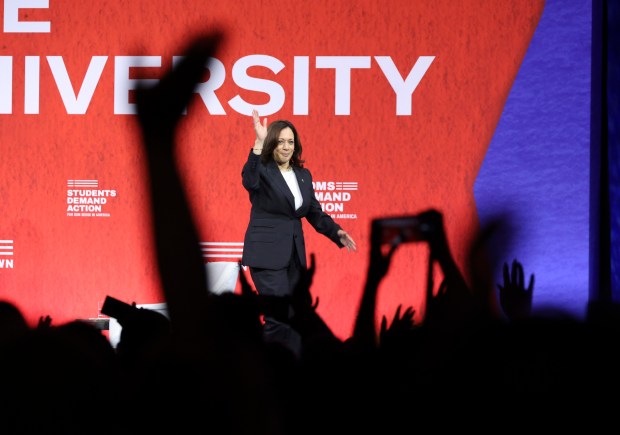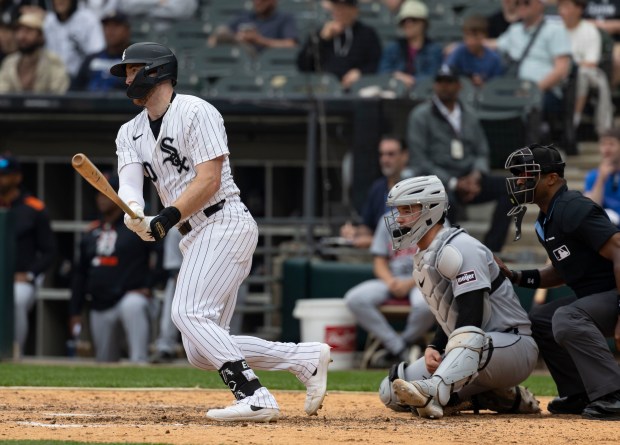When Mayor Brandon Johnson steps on stage next week to address the Democratic National Convention, he will have a national spotlight to tell the story of Chicago after a rocky year for his progressive agenda.
Johnson is slated to speak Monday evening at the made-for-TV event and plans to underscore the host city’s successes and significance in the Democratic Party, per sources close to the mayor.
Securing a slot was expected. Democratic host mayors have spoken on the first evening for the last three in-person DNCs, while Milwaukee Mayor Tom Barrett led the call to order on the second night of the virtual event in 2020.
Monday evening will likely be the most visible moment Johnson gets inside the United Center, where dozens of speakers will be trotted out over four days to cheer on Vice President Kamala Harris’s nomination. For his part, the mayor intends to seize the opportunity to pitch Chicago to party bigwigs, out-of-town politicos, business titans, everyday voters, naysayers and other observers — while connecting the city’s liberal values to Harris’s candidacy, per his political team.
In capitalizing on Harris’ bid to become the first Black and Asian woman to serve as president, Johnson has emphasized his own roots as a fellow African American leader. He is expected to touch upon that commonality next week and uplift Chicago’s role in propelling historical Black figures such as Barack Obama and the Rev. Jesse Jackson, an ally of his.
That’s no surprise coming from Johnson, who frequently talks about his experience as a Black father living on the West Side. But when he mounts the West Side stage Monday night to draw a line from himself to Black leaders from Harris to Obama to Jackson, he will be addressing a much, much bigger audience.
Johnson’s speeches discussing Harris thus far have signaled ongoing themes of family and Black identity that stretch back to his mayoral campaign, with invocations of his 10-year-old daughter to drive home the historic milestones of her presidential campaign.
In a July “Black Men for Harris” call, the mayor staked his claim as a charter Illinois member of Team Harris: “I did not flinch. I was the first elected official in the state of Illinois to come out and support (Harris). I’m committed to doing what we do well as Black men. We organize, we challenge, we provide protection.”
Johnson indeed announced his backing for Harris within a couple hours of Biden dropping out last month, bucking other Illinois Democrats who held the line until Gov. JB Pritzker’s endorsement the next day. The mayor’s team said he had been preparing for that scenario since President Joe Biden’s fateful debate against GOP nominee Donald Trump in late June.
Before Biden ended his campaign, Johnson was eager to defend the president against Trump, who remains deeply unpopular in Chicago. However, positioning himself as a fierce surrogate for Harris has presented natural advantages for the mayor — even as the vice president herself has not emphasized racial politics as much on the campaign.
Since Johnson took office, South and West side voters have remained his strongest political base, along with lakefront and Milwaukee Avenue progressives. But with signs of friction from both groups amid a string of mishaps during his first year in office, including a failed tax referendum and controversial decisions over the migrant crisis, a successful DNC could provide much-needed momentum for the Johnson administration.
On the progressive front, the mayor during his turn in the DNC spotlight plans to relate to Harris’ running mate. Minnesota Gov. Tim Walz, like Johnson, is a former social studies teacher who has been embraced by labor groups and the left flank of the party.
Johnson’s goal in doing so will be to position Chicago as a bastion of progressive politics and woo young voters, even as Harris and Biden have taken flak from the left over the Israel-Hamas war and other issues.
During a “Progressives for Harris” call last week, the mayor alluded to local debates during City Council that signaled how he views differences within the Democratic Party.
And Johnson again recited a Rev. Martin Luther King Jr. quote that he also used in his 2023 election victory speech: “When the Civil Rights Movement and the labor rights movement collide, what enormous potential we have.”
“Look, as progressives, we get to live in the duality of governance,” Johnson said during the call. “In Chicago, we’re making sure that new arrivals are welcome, but we’re also calling for reparations. We can actually call out the (Oct. 7) terrorist attacks and condemn them and also say we need a cease-fire.”
If Johnson succeeds at selling Chicago as a world-class city while also ensuring safety outside the convention — where thousands of protesters are expected — that could prove his mettle at managing major events. The mayor sees hosting big conventions and festivals as a core goal of building up the city’s reputation, with the DNC a prime example.
But beyond the Monday night speech, much of Johnson’s work during the DNC will take place behind the scenes. The logistics inside the convention hall were largely left to the Democratic National Committee and outside of the mayor’s domain, with his main jobs being to ensure safety on the streets surrounding the United Center and work with the local host committee to spruce up the city for an estimated 50,000 visitors.
The mayor, for now, is scheduled to make DNC-week stops at events hosted by World Business Chicago; One Fair Wage, the national campaign behind the successful push to eliminate Chicago’s subminimum tipped wage; conferences for U.S. mayors and African American mayors; and Rainbow PUSH, the Chicago-based civil rights organization founded by Jackson.
Johnson will also attend a summit with American Federation of Teachers President Randi Weingarten intended to “present their vision for addressing systemic inequities” in education.
Chicago Tribune’s Dan Petrella contributed.




